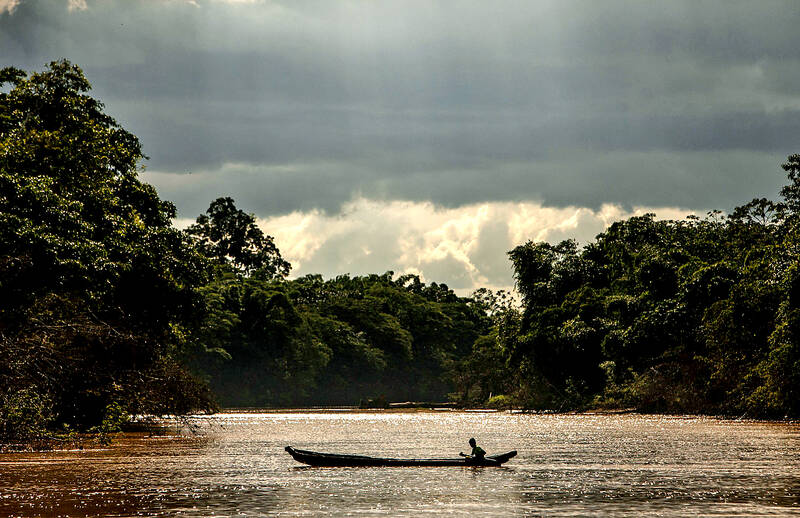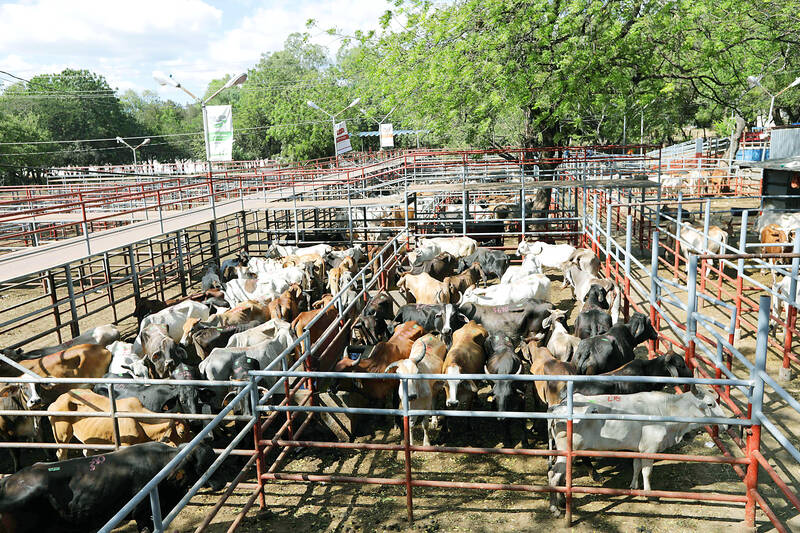Surrounded by fallen trees and languid cows, illegal cattle rancher Chacalin surveys a clearing deep inside one of Nicaragua’s largest remaining protected rainforests.
“When I came here, I knew it was a reserve. I just stole the land. I didn’t pay for it,” he says calmly, staring away from the camera.
“If they take me out of here they can take me off the land, but I don’t lose money. That’s how we operate,” he says.

Photo: AFP
Beginning in 2016, and over several years, filmmakers Camilo de Castro and Brad Allgood visited the Indio Maiz Biological Reserve for a documentary about the threats of deforestation and indigenous rights violations.
The about 2,600km2 tropical rainforest bordering Costa Rica is a biodiversity haven, and the sacred home of the indigenous Rama people, but despite legal protections, it has seen a rapid influx of illegal settlers.
After violent protests erupted in the Central American nation in 2018 — in part triggered by fury over the government’s failure to tackle a massive fire in the reserve lit by an illegal settler — investigative journalist De Castro fled his home country.

Photo: AFP
In his absence, the situation in Indio Maiz has only worsened, and Nicaraguan President Daniel Ortega’s intensifying crackdown on dissent has made it too dangerous for the filmmakers to return.
In February, De Castro was one of 94 dissidents stripped of their citizenship — along with his mother, Gioconda Belli, a prominent writer. He now lives in exile in Costa Rica.
Relying on Nicaraguans within the country to send updates and images over the encrypted Signal messaging app, the directors are premiering Patrol at the Mountainfilm documentary festival in Colorado, hoping to draw attention to the situation from afar.
“This is probably the last independent documentary that’s gonna come out on Nicaragua in who knows how long,” De Castro said. “The government basically has put up a wall around the country so that people inside can’t hear anything coming from outside, and can’t share information about what’s really happening in the country.”
The documentary follows indigenous Rama and Afro-descendent Kriols as they patrol their lands via canoe and on foot through dense, treacherous jungle, avoiding bloodsucking ticks and predatory jaguars.
It chronicles their encounters with ever-swelling ranks of newly arrived illegal settlers. Many are in the pocket of wealthy cattle ranchers living outside the reserve, and are paid to clear the land before the cows arrive.
During the filming, an indigenous patrol encounters a large, sophisticated ranch that has sprung up in the rainforest, and leaders report it to police and Nicaraguan government officials.
They are told they must pay up if they want police to investigate, while a meeting with a minister fails to materialize.
While rampant deforestation is not unique to Nicaragua, Allgood said the situation is different from places such as the sprawling Amazon, because Indio Maiz is a “small area” where “it would not be difficult to put up a barrier to prevent people from going in.”
The government is “turning a blind eye — it’s in plain sight, but nobody pays attention,” he said.
Meanwhile, the land conflict has spilled into violence. Nicaragua has recently seen a string of murders of indigenous people by settlers, many of which go unpunished.
“There’s a lot of racism involved,” De Castro said. “I would say we’re filming the last stage of 500 years of colonization in Nicaragua.”
Ninety percent of deforestation in the region is driven by illegal cattle ranching, said Christopher Jordan, Latin American director for conservation group Re:wild.
“Government corruption allows them to steal and deforest the land without consequences,” he says in the film.
Beef is one of impoverished Nicaragua’s largest exports. The country, which is the size of Mississippi, is the US’ sixth-biggest global supplier.
Since 2015, a US law requiring beef to carry a “country-of-origin” label has been dropped, meaning that consumers rarely know if their burgers or steaks come from animals reared on indigenous forest lands.
While many importing companies claim to check the origin of their beef back to its original farm, De Castro and Allgood say this is not possible in Nicaragua, where the traceability process is too opaque.
“We talk about oil, we talk about mining ... but the food industry is still not something that’s getting enough attention,” De Castro said.
“What we want is for consumers to be more wary, to ask questions when they buy beef at the supermarket,” he said.
As for the Nicaragua government?
“What we need is political will, to really make them make an example of some of these illegal cattle ranchers and throw them in jail,” he said.
“Once they throw a few of them in jail, people will think twice about going in. That’s what we want. We want the government to uphold the law,” he added.

The DBS Foundation yesterday announced the launch of two flagship programs, “Silver Motion” and “Happier Caregiver, Healthier Seniors,” in partnership with CCILU Ltd, Hondao Senior Citizens’ Welfare Foundation and the Garden of Hope Foundation to help Taiwan face the challenges of a rapidly aging population. The foundation said it would invest S$4.91 million (US$3.8 million) over three years to foster inclusion and resilience in an aging society. “Aging may bring challenges, but it also brings opportunities. With many Asian markets rapidly becoming super-aged, the DBS Foundation is working with a regional ecosystem of like-minded partners across the private, public and people sectors

BREAKTHROUGH TECH: Powertech expects its fan-out PLP system to become mainstream, saying it can offer three-times greater production throughput Chip packaging service provider Powertech Technology Inc (力成科技) plans to more than double its capital expenditures next year to more than NT$40 billion (US$1.31 billion) as demand for its new panel-level packaging (PLP) technology, primarily used in chips for artificial intelligence (AI) applications, has greatly exceeded what it can supply. A significant portion of the budget, about US$1 billion, would be earmarked for fan-out PLP technology, Powertech told investors yesterday. Its heavy investment in fan-out PLP technology over the past 10 years is expected to bear fruit in 2027 after the technology enters volume production, it said, adding that the tech would

YEAR-END BOOST: The holiday shopping season in the US and Europe, combined with rising demand for AI applications, is expected to drive exports to a new high, the NDC said Taiwan’s business climate monitor improved last month, transitioning from steady growth for the first time in five months, as robust global demand for artificial intelligence (AI) products and new iPhone shipments boosted exports and corporate sales, the National Development Council (NDC) said yesterday. The council uses a five-color system to measure the nation’s economic state, with “green” indicating steady growth, “red” suggesting a boom and “blue” reflecting a recession. “Yellow-red” and “yellow-blue” suggest a transition to a stronger or weaker condition. The total score of the monitor’s composite index rose to 35 points from a revised 31 in August, ending a four-month

RUN IT BACK: A succesful first project working with hyperscalers to design chips encouraged MediaTek to start a second project, aiming to hit stride in 2028 MediaTek Inc (聯發科), the world’s biggest smartphone chip supplier, yesterday said it is engaging a second hyperscaler to help design artificial intelligence (AI) accelerators used in data centers following a similar project expected to generate revenue streams soon. The first AI accelerator project is to bring in US$1 billion revenue next year and several billion US dollars more in 2027, MediaTek chief executive officer Rick Tsai (蔡力行) told a virtual investor conference yesterday. The second AI accelerator project is expected to contribute to revenue beginning in 2028, Tsai said. MediaTek yesterday raised its revenue forecast for the global AI accelerator used